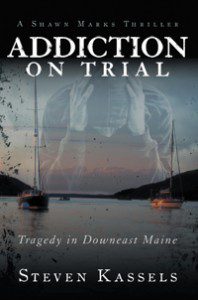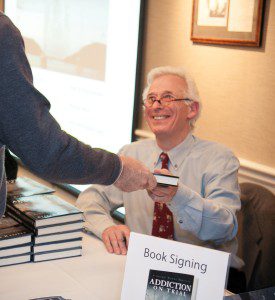"The Scourge of Heroin Addiction"
Op-ed published by the Boston Globe April 1, 2014 http://b.globe.com/1kAzt54
Governor Deval Patrick has appropriately declared the opioid addiction epidemic as a public health emergency. The governor's directives will save lives and help to put some brakes on this run away scourge to society. But questions remain and more issues need to be addressed.
For example, why is medication management for the treatment of heroin/opioid addiction scorned by so many? In a recent Boston Globe article, "Heroin Epidemic Exposes Deficiencies In Care System" (http://b.globe.com/1iNFmzo), Ms. Jacobs, Director of Substance Abuse Services for the Commonwealth of Massachusetts, acknowledged, "medications are not used as much as they could be for opiate addictions because of stigmas attached to them, she said." We watch endless commercials about how to treat illnesses such as urinary incontinence or erectile dysfunction but public service announcements addressing the heroin/opioid epidemic and the proven benefits of outpatient cost effective medication management have been relatively sparse. The governor's directives, which include public health advisories to educate the public about opioid addiction treatment options, will hopefully demystify common misperceptions, such as crime increases when there is a treatment center in one's community. In fact, there is a 50% to 80% reduction in crime by heroin addicts when in treatment. (http://bit.ly/OVVRfh ; http://1.usa.gov/1dtb42B)
We read about the blame for the heroin epidemic, but rarely do we address a complex underlying issue – that we as Americans want instant results and we want total pain relief after an injury or procedure. Injudicious prescribing of pain medications undeniably contributes to the problem, and holding doctors accountable is essential; but this is not the only reason we have an unabated heroin epidemic. Other factors include: the war in Afghanistan, which directly led to a surge in heroin production; the reconstitution of oxycontin pills, so they could not as easily be used to "shoot up" or "snort", resulting in more persons turning to heroin as a drug of choice; the increased availability of opiates through the internet; inadequate mental health treatment services resulting in some patients "self-medicating"; and the lack of addiction treatment facilities due to a common community approach of NIMBY (Not In My Back Yard) along with the stigma associated with seeking treatment for the disease of addiction. Despite the arrest of kingpins and drug pushers, big and small, we still have a supply and demand problem. The supply of heroin has increased and cost is down to as little as $4/bag. As fast as we take drug pushers off the streets, they are replaced by others - there is too much money involved. Governor Patrick is right to focus on the demand side of the issue.
If outpatient treatment is not more widely accepted and available, inappropriate hospitalizations and incarcerations of patients will continue. It is time for our locally elected officials to openly support establishing treatment centers in their communities? We all know heroin addicts, albeit we may not know who they are. They could be any one of a number of patients I have treated: your plumber; the mailman; your kid's college professor; the IRS agent who audited your tax return; the person selling flowers at the corner; the principal of an elementary school (http://bit.ly/1m6XMbL); someone who works in a mayor's office (http://bo.st/1hbtN20); or a neighbor; or a family member.
A recent study has shown that less than 20% of individuals needing addiction treatment actually received treatment (http://1.usa.gov/1hYRzvX).. Another study found that only 1 in 10 people with addiction involving alcohol or drugs other than nicotine receive any form of treatment and that "most medical professionals who should be providing addiction treatment are not sufficiently trained to diagnose or treat the disease, and most of those providing addiction care are not medical professionals and are not equipped with the knowledge" (http://bit.ly/1o2l3Ax). Are we willing to accept as status quo the present system of unnecessarily hospitalizing or incarcerating patients? We are wasting tax dollars: it costs up to $50,000 or more per year to incarcerate (http://bit.ly/1iBKSlg ; http://nyti.ms/NW5dGQ) and approximately $5,000 per year for outpatient treatment (http://bit.ly/1rCh3G6). “There are things besides beds that are effective in this system,” Jacobs said. “More people should see this treatment as a viable option.” (http://b.globe.com/1iNFmzo)
There should be just as many public service announcements about addiction as there are Viagra and Cialis commercials. In addition, expansion of addiction treatment services in jails would help to mitigate much of the revolving door phenomenon. Furthermore, we should demand that our medical schools and hospitals improve addiction training of our physicians. While there is plenty of blame to go around, let's focus on the solutions. The scourge of addiction is in all of our yards. The solution is to decrease the demand with bold public initiatives and a change in attitude. It is both the humanitarian and fiscally responsible thing to do.
Steven Kassels, MD has been Board Certified in Addiction Medicine and Emergency Medicine. He currently serves as Medical Director of Community Substance Abuse Centers and has authored the book, “Addiction on Trial: Tragedy in Downeast Maine”.




 Michigan. He has served as chief of Emergency Medicine at an inner city hospital and currently serves as the medical director and founder of Community Substance Abuse Centers. Dr. Kassels is a member of the American Society of Addiction Medicine and has presented numerous lectures and round table discussions on drug abuse related topics. Dr. Kassels currently resides in Boston, Massachusetts and Southwest Harbor, Maine.
Michigan. He has served as chief of Emergency Medicine at an inner city hospital and currently serves as the medical director and founder of Community Substance Abuse Centers. Dr. Kassels is a member of the American Society of Addiction Medicine and has presented numerous lectures and round table discussions on drug abuse related topics. Dr. Kassels currently resides in Boston, Massachusetts and Southwest Harbor, Maine.